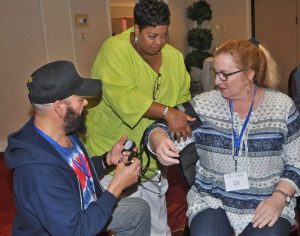Study Improves Disaster Resilience Training for Community Health Workers
– FEBRURY 6, 2018
Researchers evaluated training sessions for community health workers that included disaster-related components to provide improvements in their curricula. Feedback from participants and staff identified public health, cultural competency, community advocacy, and peer listening as the most useful training modules. Needs included more in-depth training in community resilience, environmental health, and in clinical skills, including chronic disease management. The application of these insights can help better prepare community health workers who take active roles in disaster preparedness, response, and recovery. The researchers published their findings in Journal of Public Health Management and Practice: Training community health workers to enhance disaster resilience.
Community health workers (also known as health advisors, advocates, auxiliaries, promoters, educators, and patient navigators) promote healthy lifestyles, improve health literacy, and provide basic clinical services. They play an increasingly important role in the health care system, serving as frontline public health workers employed by hospitals, hospices, clinics, and community- or faith-based organizations and helping increase access to primary and behavioral health care. As such, they can play a complementary role in helping communities deal with natural disasters and environmental emergencies, such as the Deepwater Horizon incident.
Lead study author Keith Nicholls explained that these health workers are trusted members of their communities, enjoying high levels of credibility and legitimacy, “They ‘speak the language’ of the people served, and they understand community needs and cultural norms.” However, in order to serve effectively in this capacity, community health workers must undergo rigorous and relevant training.
This study looked at supplemental and expanded courses developed by the Gulf Region Health Outreach Program that included components aimed at mitigating risks, minimizing impacts, and speeding community recovery. The study team also analyzed feedback from the 90 community health workers from southeastern Louisiana, coastal Mississippi and Alabama, and the Florida panhandle who participated in 4 two-week training sessions held between June 2013 and August 2016.
Eighty-six percent of participants rated the effectiveness of the training as very high, and a follow-up evaluation showed that they maintained this positive view. Lessons learned included avoiding covering too much material or using highly-technical scientific content and language, keeping trainees engaged with hands-on and group learning experiences, and building rapport and mutual respect for effective learning.
The study team responded to insights gained from participant and staff comments by incorporating more in-depth clinical skills training and content on the 10 most common chronic diseases and conditions into subsequent sessions. In collaboration with the Consortium for Resilient Gulf Communities, a select group of community health workers and their supervisors received supplemental training that focused on community resilience, including in-depth concepts, illustrative examples, and a review of community resilience-building projects. The team suggested more-evolved peer listening modules, an emergency management system overview (to facilitate communication between response officials and the public), and an environmental health risks and resources module (to better advocate for community needs before a disaster).
“In addition to their typical healthcare roles and pre-disaster functions, community health workers could serve as valuable members of disaster response and recovery,” said Nicholls. “Their standing in their communities may give community health workers significant advantages over other actors in emergency management.” The authors recommended that emergency managers, responsible parties, and public health officials support and facilitate the training and placement of community health workers in disaster-prone areas to maximize their potential utility.
As community health workers become more involved in future disasters, there is a critical need to learn about their experiences and gain fresh recommendations about how to further improve their training.
The study’s authors are Keith Nicholls, Steven J. Picou, and Selena C. McCord.
************
This research was made possible in part by a grant from the Gulf of Mexico Research Initiative (GoMRI) to the Consortium for Resilient Gulf Communities (CRGC). Other funding sources included the Gulf Region Health Outreach Program through the Deepwater Horizon Medical Settlement.
The Gulf of Mexico Research Initiative (GoMRI) is a 10-year independent research program established to study the effect, and the potential associated impact, of hydrocarbon releases on the environment and public health, as well as to develop improved spill mitigation, oil detection, characterization and remediation technologies. An independent and academic 20-member Research Board makes the funding and research direction decisions to ensure the intellectual quality, effectiveness and academic independence of the GoMRI research. All research data, findings and publications will be made publicly available. The program was established through a $500 million financial commitment from BP. For more information, visit https://gulfresearchinitiative.org/.
© Copyright 2010-2018 Gulf of Mexico Research Initiative (GoMRI) – All Rights Reserved. Redistribution is encouraged with acknowledgement to the Gulf of Mexico Research Initiative (GoMRI). Please credit images and/or videos as done in each article. Questions? Contact web-content editor Nilde “Maggie” Dannreuther, Northern Gulf Institute, Mississippi State University (maggied@ngi.msstate.edu).






